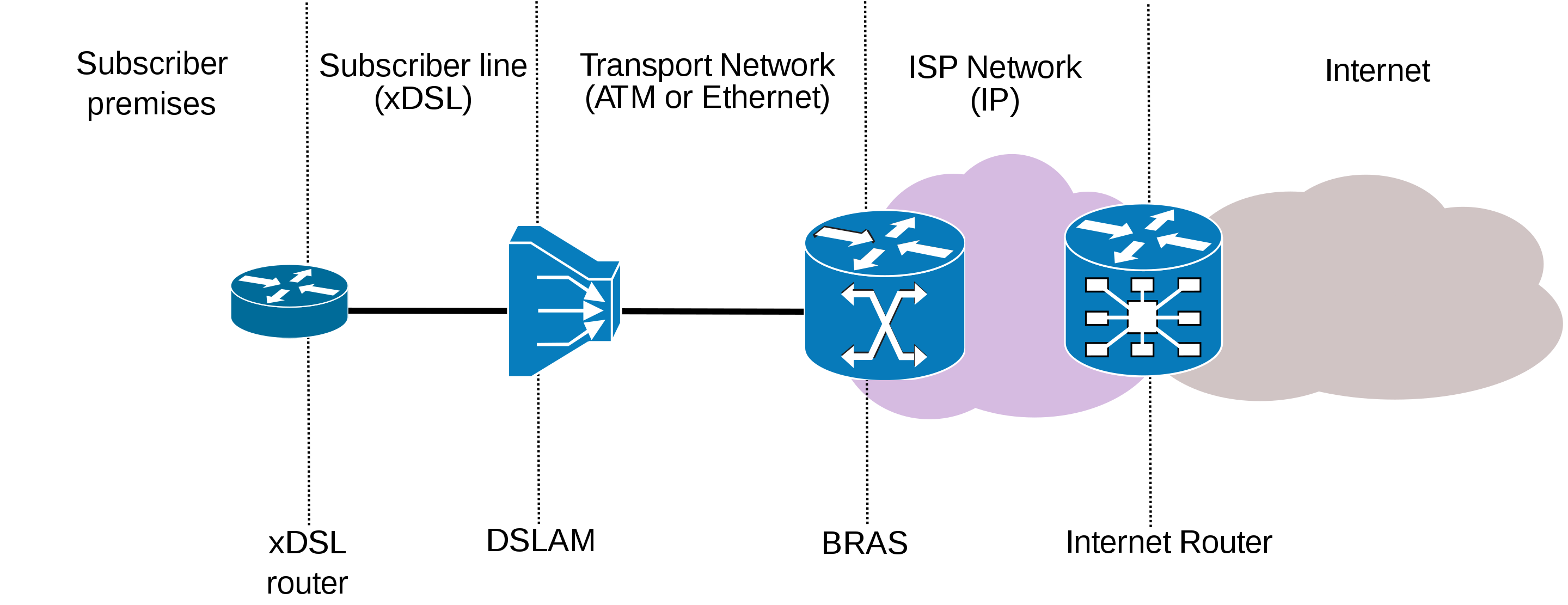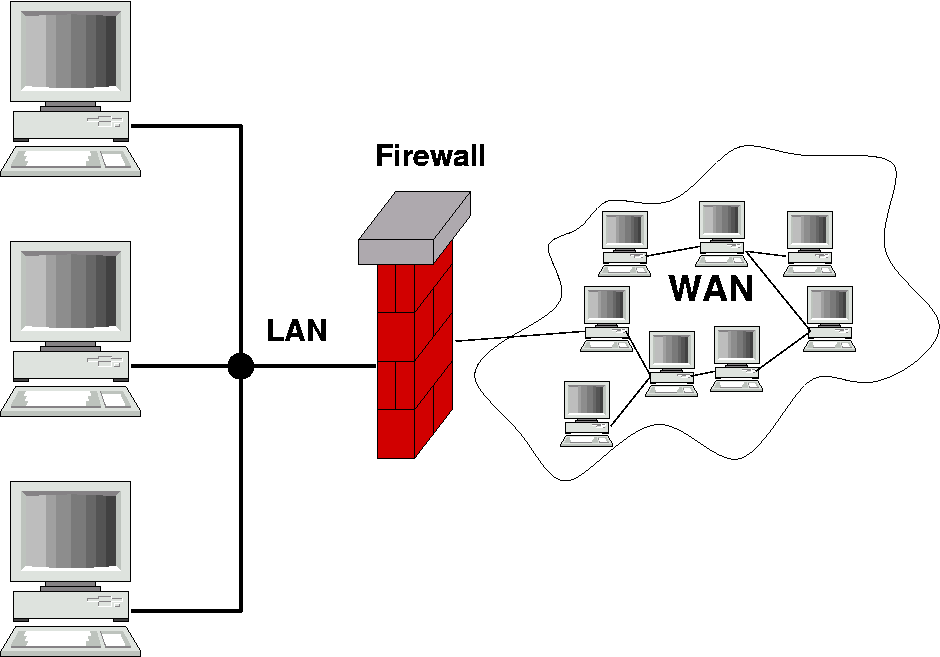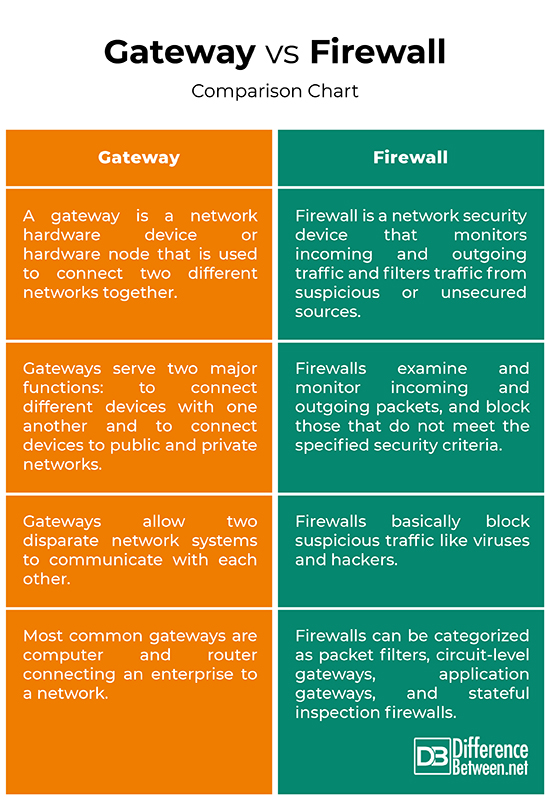Difference Between Gateway and Firewall
A gateway is a networking device that regulates network traffic between two disparate networks. A router is also a gateway in itself, which receives signal from the wide area network and directs it across the local area network. It basically links two different networked systems together. Firewalls, on the other hand, are a filtering system which determines which data packets should be permitted or denied access to pass through.

What is Gateway?
A gateway is a network hardware device or hardware node that is used to connect two different networks together, allowing users to communicate across several networks. As the name suggests, a gateway acts as a ‘gate’ between two disparate networks. It is basically a networking device with dedicated hardware and software that makes communication possible between two different networks with different architectures and protocols. Gateways are essential for communication between terminals connected to heterogeneous networks with different network characteristics and using different protocols. Most common gateways are computer and router connecting an enterprise to a network. Gateways are very crucial when a company makes changes from one configuration to another, so that the old and new systems can work simultaneously. Gateways are implemented either as hardware, software, or a combination of both. Gateways serve many different functions, so defining a gateway is no simple task.

What is Firewall?
Firewalls are a crucial element of a secure network in today’s Internet. Broadly speaking, firewall is a network security system specifically designed to prevent any kind of unauthorized access to and from a private network. Firewalls carefully and thoroughly analyze the incoming and outgoing traffic based on pre-set rules and filter traffic from suspicious or unsecured sources. Like gateways, firewalls can be implemented in both hardware and software, or a combination of both. Firewalls safeguard your computer at the entry point called ports, in order to prevent unauthorized users such as hackers from accessing private networks connected to the Internet, particularly intranets. Firewalls typically inspect the packets and monitor the connection, and then filter connections based on the packet inspection results. Packet inspection determines whether the packet should be permitted or denied based on the pre-defined access policy. It may involve inspection of multiple elements such as source IP address, destination IP address, source port, destination port, IP protocol, and packet header information.
Difference between Gateway and Firewall
Meaning
– A gateway is simply a networking device or hardware node that is used to join two different networks with different protocols and network characteristics together. It basically links two disparate networks together, allowing users to communicate across several networks. Firewall, on the other hand, is a security system that sits between the modem and the route. It can be a standalone hardware device or built into the router itself. Firewall is a security system that monitors incoming and outgoing traffic based on a pre-defined set of rules and filters traffic from suspicious or unsecured sources.
Purpose
– Gateway a networking device with dedicated hardware and software that makes communication possible between two different networks with different architectures and protocols. Gateways are implemented either as hardware, software, or a combination of both and they serve two major functions: to connect different devices with one another and to connect devices to public and private networks. Firewalls, on the other hand, safeguard your computer in order to prevent unauthorized users such as hackers from accessing private networks connected to the Internet, typically intranets. Firewalls basically block suspicious traffic like viruses and hackers.
Working
– Gateways usually operate at OSI layer 4 or higher, and typically translate the protocols to allow terminals on two different networks to communicate with each other. Gateways can be both hardware and software, or combination of both. The term gateway can be used in many contexts, but in general, it refers to a hardware or software interface that allows two disparate network systems to communicate. Firewalls, on the other hand, typically inspect the packets and monitor the connection by inspecting the source and destination IP address, source and destination port, IP protocol, and packet header information, and then finally determine whether the packet should be permitted or denied.
Gateway vs. Firewall: Comparison Chart

Summary of Gateway vs. Firewall
In a nutshell, the term gateway is used in many contexts and there is a wide range of varied applications for gateways, and they can function at any of the OSI layers. However, in general, a gateway is simply a hardware or software interface that allows two different networks to communicate with each other. It basically links two disparate networks together, allowing users to communicate across several networks. Firewall is either the cornerstone of an organization’s security infrastructure, a security system that monitors and controls the traffic between network segments. Firewalls prevent unauthorized users from accessing private networks connected to the Internet, particularly intranets. Firewalls basically block suspicious traffic like viruses and hackers by monitoring the incoming and outgoing traffic based on pre-defined set of rules.
- Difference Between Caucus and Primary - June 18, 2024
- Difference Between PPO and POS - May 30, 2024
- Difference Between RFID and NFC - May 28, 2024
Search DifferenceBetween.net :
Leave a Response
References :
[0]Image credit: https://it.wikipedia.org/wiki/Broadband_Network_Gateway#/media/File:XDSL_Connectivity_Diagram_en.svg
[1]Image credit: https://commons.wikimedia.org/wiki/File:Gateway_firewall.png
[2]Russell, D. The Principles of Computer Networking. Cambridge, United Kingdom: Cambridge University Press, 1989. Print
[3]Zhang, Peng. Advanced Industrial Control Technology. Amsterdam, Netherlands: William Andrew Publishing, 2010. Print
[4]Karris, Steven T. Networks: Design and Management. Fremont, California: Orchard Publications, 2002. Print
[5]Noonan, Wes and Ido Dubrawsky. Firewall Fundamentals. Indianapolis, Indiana: CISCO Press, 2006. Print
[6]Singh, Brijendra. Data Communications and Computer Networks. New Delhi, India: PHI Learning, 2014. Print
